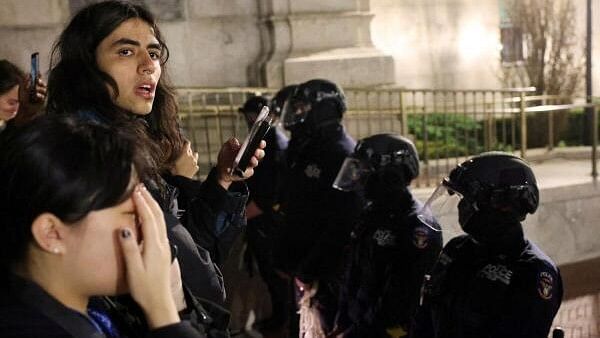
Students react as police stand guard at Columbia University, where a building occupation and protest encampment had been set up in support of Palestinians, during the ongoing conflict between Israel and the Palestinian Islamist group Hamas, in New York City, US, April 30, 2024.
Credit: Reuters Photo
United Nations/New York: The UN’s top human rights official has voiced concern over “heavy-handed steps” taken to disperse and dismantle pro-Palestinian protests across university campuses in the US, just hours before the New York Police Department arrested and cleared protesters at the prestigious Columbia University.
Hundreds of police officers swept into Columbia University on Tuesday night to end the pro-Palestinian occupation of an administration building and sweep away a protest encampment, acting after the school's president said there was no other way to ensure safety and restore order on campus.
The police cleared 30 to 40 people from inside Columbia University's Hamilton Hall late Tuesday after pro-Palestinian protesters occupied the administration building in New York earlier in the day.
“Freedom of expression and the right to peaceful assembly are fundamental to society – particularly when there is sharp disagreement on major issues, as there are about the conflict in the Occupied Palestinian Territory and Israel,” UN High Commissioner for Human Rights Volker Turk said on Tuesday.
Turk said he was troubled by the 'series of heavy-handed steps' taken to disperse and dismantle protests across university campuses in the US.
Noting that in recent weeks, thousands of US university students have been protesting against the war in Gaza, the UN agency said that at several locations, protests have been dispersed or dismantled by security forces.
Police use a vehicle named "the bear" to enter Hamilton Hall from a public street, which was occupied by protesters, as other officers enter the campus of Columbia University, during the ongoing conflict between Israel and the Palestinian Islamist group Hamas, in New York City, US, April 30, 2024.
Credit: Reuters Photo
“Hundreds of students have been arrested. Many have subsequently been released, while others still face charges or academic sanctions,” the UN agency said.
“Actions taken by university authorities and law enforcement officials to restrict such expression need to be carefully scrutinised, to ensure such measures go no further than what is demonstrably necessary to protect the rights and freedoms of others, or for another legitimate aim such as maintenance of public health or order,” Turk said.
“I am concerned that some of the law enforcement actions across a series of universities appear disproportionate in their impacts,” he added.
US universities have been gripped by protests as students demand a boycott of companies and individuals with ties to Israel during the disastrous war in Gaza.
Columbia University President Minouche Shafik, in a letter to the NYPD regarding the “unrest” on campus, said that a group of individuals had entered Hamilton Hall on campus for the “purpose of occupying the building”.
“We believe that while the group who broke into the building includes students, it is led by individuals who are not affiliated with the University. The individuals who have occupied Hamilton Hall have vandalized University property and are trespassing,” Shafik wrote.
“With the utmost regret, we request the NYPD's help to clear all individuals from Hamilton Hall and all campus encampments. As part of this process, we understand that the NYPD plans to use its LRAD technology to inform participants in the encampments that they must disperse,” Shafik said, adding that there has been a continuing encampment on the West Lawn of Columbia’s Morningside campus since April 19.
“The takeover of Hamilton Hall and the continued encampments raise serious safety concerns for the individuals involved and the entire community. The actions of these individuals are unfortunately escalating. These activities have become a magnet for protesters outside our gates which creates significant risk to our campus and disrupts the ability of the University to continue normal operations,” Shafik said.
Shafik added that the events on campus “have left us no choice. With the support of the University’s Trustees, I have determined that the building occupation, the encampments, and related disruptions pose a clear and present danger to persons, property, and the substantial functioning of the University and require the use of emergency authority to protect persons and property”.
Turk emphasised that antisemitic conduct and speech were totally unacceptable and deeply disturbing. Anti-Arab and anti-Palestinian conduct and speech were equally reprehensible, he said.
“Incitement to violence or hatred on grounds of identity or viewpoints – whether real or assumed - must be strongly repudiated,” he said.
“We have already seen such dangerous rhetoric can quickly lead to real violence. Such conduct can, and must be, addressed individually, rather than through sweeping measures that impute to all members of a protest the unacceptable viewpoints of a few. Here, as elsewhere, responses by universities and law enforcement need to be guided by human rights law, allowing vibrant debate and protecting safe spaces for all."
The High Commissioner stressed that any restrictions to freedom of expression and the right to peaceful assembly must be strictly guided by the principles of legality, necessity and proportionality. These standards must also be applied without discrimination, he added.
“US universities have a strong, historic tradition of student activism, strident debate and freedom of expression and peaceful assembly,” Turk said while adding that, "It must be clear that legitimate exercises of the freedom of expression cannot be conflated with incitement to violence and hatred.”
Shafik said Columbia is “committed to allowing members of our community to engage in political expression – within established rules and with respect for the safety of all. The policies we have in place around demonstrations are in place to support both the right to expression and the safety and functioning of our university”.
Law enforcement will be there through May 17, the end of the university's commencement events. Columbia's protests, which began earlier in April, kicked off demonstrations that now span from California to Massachusetts.